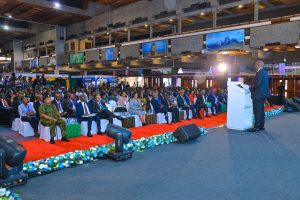A new kind of migration
On a Tuesday morning in a sun-splashed café in leafy a Nairobi neighborhood, laptops open before flat whites, you’ll hear a dozen accents discussing deadlines across three time zones. A designer in from Lisbon is troubleshooting a client handoff, a machine-learning engineer from Lagos scans code between bites of mandazi, at the corner table, two founders whisper through a Figma prototype. None of them work for local firms and yet their rent, their groceries, their rides, their weekends in Naivasha all add up here. This is the quiet economy of digital nomadism, now knocking on Africa’s door.

This is not tourism as usual. It’s the quieter migration of remote professionals who bring their work with them, staying for months rather than days, and spending locally while their incomes arrive from elsewhere. Governments have noticed. In recent years, “digital nomad” or remote-work visas have moved from experiment to policy toolkit, an attempt to capture footloose talent without igniting domestic labor fights.
What these visas actually do
Most programs follow a simple pattern, prove you work for a foreign employer or run your own company abroad, meet a minimum income threshold, buy health insurance, and you can live legally for six to twelve months, sometimes longer. The pitch is pragmatic. Nomads rent apartments, join gyms, buy groceries, and fill co-working spaces. They don’t typically compete for local jobs, and they showcase the city to future visitors. Towns that lost residents to big capitals suddenly see co-working spaces humming and neighborhood cafés busy on weekday afternoons.
Why the race is intensifying
Countries aren’t just courting sunshine seekers. They’re chasing year-round stability in visitor spending. Traditional tourism rises and falls with seasons; remote workers flatten the curve. That’s why island nations and smaller European states led early, streamlining paperwork and emphasizing connectivity as much as beaches. The market has matured too. Today’s applicants look beyond clichés, comparing internet reliability, mid-term housing, safety, and whether the local scene has meetups, maker spaces, and decent public transport.
The case for Africa
Africa has the time-zone advantage for Europe, cost structures that stretch a remote salary further, and a set of cities whose reputations have shifted from “interesting” to “compelling.” Nairobi’s tech ecosystem, Kigali’s efficiency, Dakar’s creative energy, Accra’s music scene, and Cape Town’s outdoor-urban blend all read like a lifestyle portfolio for knowledge workers. Early movers such as Mauritius and Cabo Verde have shown that clear rules and good marketing can turn curiosity into arrivals. South Africa has discussed a remote-work visa; others are studying models and talking to local tech communities and tourism boards.
Benefits that outlast a season
When these programs work, they don’t just boost occupancy rates. They widen the aperture on collaboration. A city that attracts product managers and designers will inevitably see collisions with local founders and students at meetups, hack nights, or over shared desks. Co-learning happens informally as camera clubs become micro-courses in content production, weekend cycling groups morph into intros to supply-chain software, a coffee-shop conversation becomes a six-month mentorship. None of this replaces formal job creation, but it layers new relationships onto existing economies and nudges them more digital.
The pressure points to watch
Success brings friction. Rents can climb in popular neighborhoods. Short-lets can elbow out long-term tenants. “Good internet” in one district can mask poor reliability elsewhere. Policymakers in African capitals have the advantage of hindsight: they can require longer minimum stays to discourage churn, nudge landlords toward mid-term leases, tie visa renewals to local registration (not just tourist stamps), and ring-fence parts of housing stock for residents. They can also link visas to contributions that leave a trace, participation in community workshops, discounted seats for locals at co-working hubs, or support for neighborhood digital labs.
What a smart visa looks like
The strongest programs are boring in the best way: predictable fees, transparent income thresholds, responsive consulates, and realistic processing times. They bake in basics like proof of health insurance, background checks without turning the process into a scavenger hunt. They coordinate across ministries so immigration, tourism, and ICT are aligned on messaging and data. And they publish the small print that matters to remote workers: whether they need local tax numbers, how to open a bank account, how to obtain a SIM, what counts as acceptable proof of income for freelancers. The more legible a city is on day one, the more likely a visitor becomes a six-month resident who tells friends to come.
Infrastructure is destiny
None of this works without reliable internet and power. That means redundancy, fiber plus 5G, backup for load-shedding, and public spaces that treat Wi-Fi as civic infrastructure, the way parks treat benches and lighting. It also means the less glamorous bits: clear addresses, simple e-payments that work with foreign cards, and municipal services that can be accessed online. Cities that sweat these details, maps that actually match the street grid, sidewalks you can roll a suitcase over, ride-hail coverage at odd hours, earn reputations that marketing budgets can’t buy.
Storytelling matters as much as policy
Digital nomads don’t choose countries; they choose narratives they can picture themselves inside. Cities that surface their distinct scenes including film festivals, cycling clubs, live-coding nights, rooftop poetry readings, convert browsers into applicants. Africa’s storytelling edge is real: food, music, design, and nature collide in ways that feel new to many visitors. The task is to package that energy with practical information and to make the welcome feel official, not improvised.
A chance to lead, not follow
The movement is not a fad. It’s a structural change in how knowledge work is organized and where it can happen. Africa’s opportunity is to set terms early and fairly: visas that favor longer, steadier stays; incentives that spread benefits beyond a few streets; infrastructure that serves residents first and visitors by extension. Do that, and the continent won’t just host a wave of remote workers, it will help shape what the next decade of mobile work looks like.




